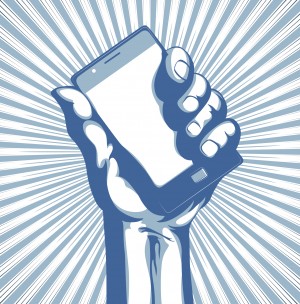Yes, smart phones are actually underhyped
 Last month, toward the end of an on-stage conversation at Wired’s Disruptive by Design Conference, Mark Andreessen (he of the Mosaic browser, giant venture fund, and shiny, egg-shaped pate), unleashed a corker.
Last month, toward the end of an on-stage conversation at Wired’s Disruptive by Design Conference, Mark Andreessen (he of the Mosaic browser, giant venture fund, and shiny, egg-shaped pate), unleashed a corker.
The smart phone revolution, he said, is under-hyped. “We have never lived in a time with the opportunity to put a computer in the pocket of 5 billion people.”
Techno-bluster?
Maybe not.
Technology Review has a fascinating piece chock-a-block with startling factoids (emphasis added):
- In 2006, smart phones accounted for just 6% of U.S. mobile phones sold that year. Today, “smart phones represent more than two-thirds of all U.S. mobile-phone sales.”
- “In 1982, there were 4.6 billion people in the world, and not a single mobile-phone subscriber. Today, there are seven billion people in the world — and six billion mobile cellular-phone subscriptions.” Of those subscriptions, 73 percent are now in the developing world, even though those countries account for just 20 percent of the world’s GDP.”
- “According to IDC, smart phones accounted for 36 percent of global mobile-phone shipments in the first quarter of 2012, up from 25 percent a year earlier. If smart phones continue to gain at even this pace, ‘feature phones’ will be largely a memory in another five years.”
- Right now the world has 1.4 billion PCs in use. “Mobile phones, on the other hand, are already selling more than 1.4 billion units every single year.”
The moral of the story: As always, ignore Andreessen at your peril.
I think smart phones or ipad type devices will just about do away with regular computers over the next few years.
I think that voice + motion recognition will do away with clumsy power draining keyboards and cumbersome solid interfaces shortly after that. Now if only there was a giant leap in solar cell/kinetic technology as too…
I am not surprised about smart phones, I do not know anyone that does not have a smart phone.
I finally caved this year and bought a smart phone. I now describe myself, only half in jest, as a cyborg. I am almost never without it, and use it for teaching, research, controlling other devices, photography, navigation, telling me when the next bus arrives… And, to boot, I can even make phone calls with it!
These things are a significant leap.
How would low income people in developing countries afford the data plans?
Many people won’t sign up for a data plan but instead use a pre-paid SIM card and then just be connected to the internet and be charged by minute, or go to public places where there is free WiFi access. This might seem like a very cumbersome way to use smartphones for us, but there are plenty of situations where this still provides more benefits than not having a smartphone at all.
Or even low-income people in this country? That’s the thing with technology–as society shifts “upward” to accommodate itself to these technologies, those who can’t afford them are increasingly shut out of full participation in society.
There is no surprise about Smart phone but the problem is the advanced the smart phone, the worst our communication skills.
Previously, when we don’t have smart phone, we are patient, talk slowly, listen carefully. But with smartphone, we are getting impatient. Everything needs to do fast.
Personally I find that smart phones allow the instant connection, I currently talk to friends overseas on a regular basis that have never owned a computer(there are net cafes on every corner) but own a smartphone, in my countries data plans are far more affordable then what we see in North America.
In todays market we want things instantly, the smart phone allows for that, most want to connect.
It almost seems silly to keep calling them phones. They really are small pocket computers. Thanks for posting this.